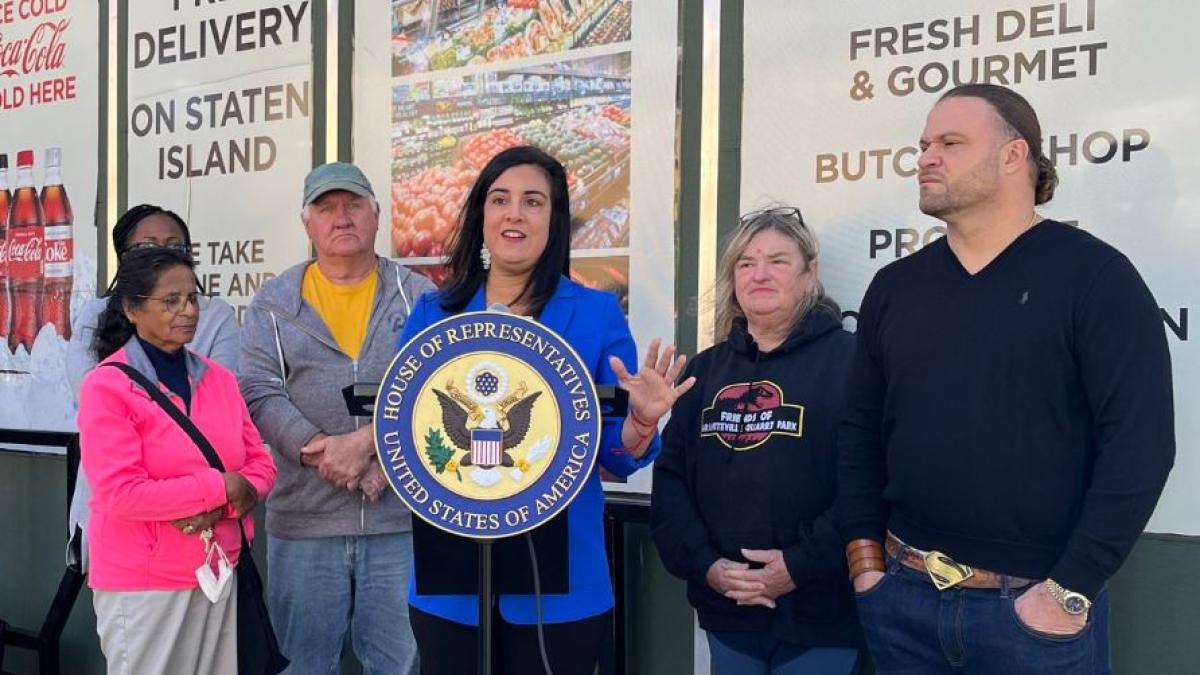Alarmed by $5 eggs and iceberg lettuce? $18.50 for a bowl of soup? Malliotakis: It’s all about spiking energy costs.

On a breezy fall afternoon outside of Olive Tree Marketplace, Congresswoman Nicole Malliotakis (NY-11) talked about skyrocketing inflation and soaring energy costs. The Sunnyside grocery store seemed a fitting backdrop for her press conference, as its owner, David Shehadeh, drove home the impact high gasoline prices on his food operation — and ultimately, his customers.
“The rates for deliveries [to me] have increased and now there’s now a surcharge for gas, which is making my profit margin very low to the point where it’s hard to do business,” said Shehadeh.
He noted, “It’s hard to get inventory in the store and to keep the prices low. Right now, a head of lettuce is $5 and eggs are through the roof. We’re getting charged multiple fees just to get products through the door and on our shelves. It’s like double jeopardy and it’s very difficult to operate a business like this.”
Shehedah emphasized his position was not a political one. He said the whole picture was a dire one and added, “This is not about being a Republican or being a Democrat. This is about America supporting Americans.”
Malliotakis offered, “As a result of the lack of domestic energy production we’re seeing from the Biden Administration, we’re seeing the impact of inflation soar on goods and food being transported. Stores don’t want to raise prices on their consumers, and many are eating the rising costs themselves to hold the line. We’re going to end up losing mom-and-pop shops if this continues — there’s only so much cost they can eat before passing it on to the consumer.”
Comments sought by congressional candidate Max Rose were not received by deadline.
Malliotakis explained the cause-and-effect of high energy prices hyper-locally and said, “Energy impacts every aspect of our life and we take it for granted. Manufacturers who are producing these goods require energy. The transportation of the goods requires energy and our stores do as well. When we see this type of rise in energy cost due to policies put in place by the Biden Administration, the cost is ultimately passed down to the consumer.”
INFLATION, RESTAURANTS AND BUYING MEALS
According to multiple reports and government data, food costs have spiked 13 percent since 2021, on basics like certain poultry products, notably turkey, canned produce and flour, the latter at the root of price spikes in prepared baked goods. By the USDA’s standards, economy-wide inflation is up 8.2 percent from September 2021. The agency also noted, “The CPI for all food increased 0.7 percent from August 2022 to September 2022, and food prices were 11.2 percent higher than in September 2021.”
Outrage over massive fluctuations in food cost is a prevalent sentiment in the restaurant industry on Staten Island. Several owners polled around the borough say they’ve reached their threshold on pricing, having raised entree items minimally over the year so as not to scare away the customers.
One chef said he was debating on closure after December. With his sales down about 70 percent over last year — already a tough year with COVID vaccination card checks on top of recovery from the pandemic’s dining room shutdowns. He guessed patrons have their own concerns about budgets and stretching a dollar.
“I get that. But I can’t keep on going like this. I’m the only one not coming home with a paycheck,” he admitted.
National statistics reflect local restaurateurs’ collective restraint in passing along higher costs to the consumer. The USDA makes note that food-away-from-home (restaurant purchases) have not kept up the same price increases as have been seen in the supermarket. From September 2021 to September 2022, grocery store purchases are 13 percent more costly whereas restaurant purchases are only 8.5 percent higher than from the same timeframe.
Pete Marcolini of Aunt Butchie’s of Brooklyn illustrates the effect of inflation with a popular seasonal soup, which has doubled in cost to him. Plating a pumpkin-inspired creation for customers who dine in at the Richmond Valley restaurant is $12.95 this fall.
“The soup is served in a pumpkin,” he said of its presentation at the table. He has to charge $18.50 a portion to cover now pricy produce and staples like butter, cream and Mascarpone cheese.
PETROLEUM PRICES
Malliotakis’ press conference took the position that petroleum prices were at the nut of business owners’ and consumers’ consternations.
The congresswoman said, “Instead of ramping up domestic production, we’re seeing the Biden Administration raid our strategic petroleum reserves to the point where we’re at a four-decade low. The reserves are meant for emergencies and natural disasters, not to manufacture low prices. This all could be avoided by ramping up all forms of domestic energy production, lifting bans on permitting, making sure we invest in pipeline infrastructure and incentivizing energy companies to expand their operations.”
Also present at the Wednesday morning presser was Kathy Romanelli, president of the Mariners Harbor Civic Association. She added, “When they see $7.99 for 18 eggs or milk at $5 per gallon, it’s horrendous. All of this can be stopped by our president, who just refuses to address it. People have to keep going to food pantries to support their families and it’s really horrendous.”
Malliotakis further blamed the current economic climate on a lack of new land leases for oil drilling, a stopped pipeline construction, and a general discouragement in the production of American energy resources. Yet there is hope for the future, she added, pointing to pending legislation such as the Transparency and Productions of American Energy Act and the Reducing Farm Input Costs and Barriers to Domestic Production Act.
The latter, she summed up, keeps at bay “bureaucratic hurdles and regulatory barriers to domestic agriculture production.” Malliotakis said the initiatives also “empower the energy sector to innovate and expand access to federal lands and waters for responsible energy development.”